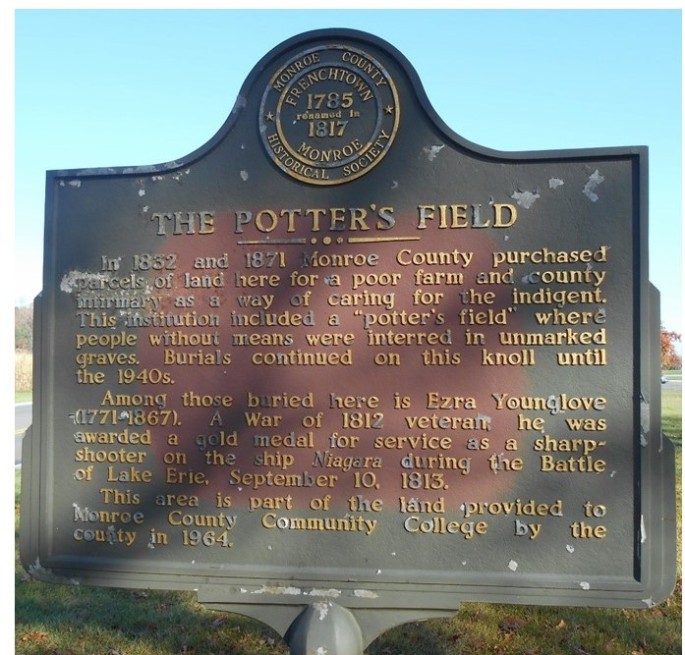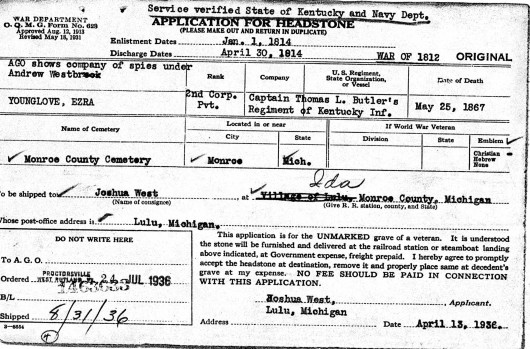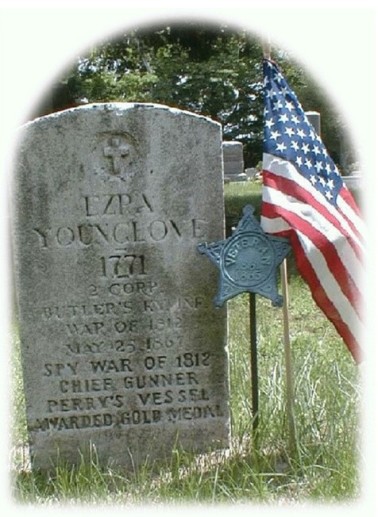
Ezra Younglove, Oliver Hazard Perry’s principal gunner on the Niagara at the Battle of Lake Erie, told his grandnephew Joshua West where he wanted to be buried. Joshua and the rest of Ezra’s family complied with his wishes. Along with 195 other people, Ezra rests in an unmarked grave in Potter’s Field on a hilltop in front of Monroe Community College. In 1988, the Monroe County Historical Society placed the only marker in the Potter’s Field which identifies Ezra Younglove, but none of the other people buried there.
From 1937 through the 1950s, a military marker that his grand nephew fought for and the Detroit Chapter of the National Society of the United States Daughters of 1812 dedicated, identified Ezra’s grave. The marker read: , “2 Corp Busters (sic) Ky. Inf. War of 1812. Spy, War 1812, Chief Gunner Perry’s vessel, Awarded gold medal.”

The Detroit Chapter of the National Society of the United States Daughters of 1812 celebrated the 124th Anniversary of Commodore Perry’s victory on Lake Erie by dedicating a white marble marker on the grave of Perry’s chief gunner, Ezra Younglove. The ceremony was held on Thursday September 16, 1937 at the Monroe County Cemetery.
The General Alexander Macomb Chapter of Detroit of the Daughters of 1812, hosted the ceremonies. Mrs. Marvin L. Hoagland , president, conducted the services and Mrs. Gordon W. Kingsbury, past state president and chapter chaplain, led the prayers. Rep. Earl C. Michener of Adrian delivered the address and Mrs. Helen Baker Rowe of Grand Rapids represented the State Chapter.
Ezra Younglove’s grandnephew Joshua West delivered the commemorative address and unveiled the monument. In his address, Joshua West told some family stories about Ezra that some genealogists contended were fiction. Joshua insisted that the stories were oral tradition and probably true.[1]
Joshua’s Great Uncle Ezra
In his speech, Joshua West described Ezra’s father, Samuel Younglove, as medium tall, rawboned, and heavily muscled. He possessed enough strength of character to finish any task he started. Samuel Younglove was one of General George Washington’s first volunteers in the Revolutionary War, and he, two sons, and a son-in-law fought the beginning battles with Washington.
Samuel told the story that on one occasion, the sparse equipment and supplies that General Washington needed to fight the war were stuck in the mud and he called his men together and told them that prospects of victory were dim. Samuel Younglove stepped forward, saluted General Washington, and said: “There is nothing impossible; we can bring forward the equipment.”
George Washington smiled and said to Samuel, “Detail your men and bring them forward and we will win the war.”
General Washington eventually did win the Revolutionary War and Samuel passed down the story to his descendants, including Joshua West who passed it on to his descendants.[2]
Samuel Younglove survived the Revolutionary War, but his two sons and son-in-law were killed or died of exposure. Altogether, Samuel and his wife Anna Keeler Younglove had four sons, including Ezra and two daughters, including Elizabeth Younglove West. Samuel and Anna’s son, Ezra , was born in 1771 in Monroe County, New York. In 1783, when he was 12, Ezra enlisted in the Revolutionary War as a page to a high ranking officer. One of his favorite stories that he told his family involved delivering an important message for his officer who asked, “Will you deliver this and return with an answer?”
Ezra answered, “I will.”
The officer and his fellow soldiers didn’t really believe Ezra could deliver the message because the delivery involved crossing swollen streams with no bridges, They recruited another page for backup and gave him the message and a horse with the same instructions they had given Ezra. Ezra delivered the message and returned safely. Days later, the other messenger returned, but without delivering the message and without his horse. [3]
After the Revolutionary War, Ezra set about to learn a trade to make a living, and he became what he called a Smith, a blacksmith. Joshua’s father Henry Younglove West, called Ezra a smith and his cousin Levi Warren who researched Younglove history for years, also called him a smith. Joshua West contended that Ezra was a machinist, and such a skilled one that he worked all over the United States.
When strained relations between Great Britain and the twenty something United States erupted into the War of 1812, Ezra enlisted in Andrew Westerbrook’s Company of Spies. Joshua West told another family story about Ezra’s early service in the war. He said that Ezra fought a sword duel with a British soldier and after killing the soldier, Ezra discovered a severe wound of his own – a gash in his left shoulder blade spreading diagonally across his back for about ten inches. After he had lost much blood, the Indians rescued him and the medicine man sewed his wound with slippery elm bark. The Indians nursed Ezra back to health, and they remained his steadfast friends after he recovered. The Army discharged Ezra because of his severe wound and he returned to Kentucky where he had been living before the War.[4]
Chief Gunner with Commodore Perry
Although he had recovered from his first wound, Ezra’s zeal to keeping serving his country had not lessened, so he enlisted in the American military again, this time with Captain Butler as a Second Corporal in the Kentucky Volunteers. The Army and Navy picked most of the soldiers to serve on Commodore Oliver Hazard Perry’s vessels from the Kentucky Volunteers and they chose Ezra among others. Soon he earned a promotion as Chief Gunner or sharpshooter.[5]
On September 10, 1813 Ezra manned his gun aboard the Niagara during the Battle of Lake Erie, between American and British ships. He watched Commodore Perry board the Niagara after British fire power had disabled his flagship, the Lawrence. He told one of his favorite stories about Perry’s victory on Lake Erie and how Commodore Perry had said, “Don’t give up the Ship,” and commanded his men to double the charge because he knew the strength of the little guns. Commodore Perry prevented the British from taking the Lawrence and eventually forced the British to surrender their six ships in a crucial naval victory that boosted American morale and assured American control of the Old Northwest. In 1860, at a historic meeting in Toledo, Ohio, the speaker identified Ezra Younglove as the only living participant in Perry’s victory and praised him as chief gunner of great skill who helped win the battle.
After the battle, the Army honorably discharged Ezra Younglove and awarded him $447.39 in prize money. In 1813 Ezra Younglove lived in Christian County, Kentucky, and Perrin’s history of Christian County, Kentucky explained how the state of Kentucky awarded Ezra a gold medal for his gallantry. Meacham’s History of Christian County, Kentucky, lists Samuel Younglove, Ezra’s father, as one of the resident Revolutionary War veterans in Christian County.
Ezra Younglove Marries Catherine LaFontaine
Ezra Younglove came to Frenchtown about 1814, practiced his machinist trade, and began to accumulate a fortune. He also married a widow and acquired a ready-made family of five children. Younglove family researcher Grace Younglove Hudson noted on the Younglove website that although Ezra Younglove’s marriage to Catherine Chabert La Fountaine, the widow of Francois Dubord LaFontaine, took place on August 8, 1820 in Detroit they could have been married as soon as 1816. Francoise LaFontaine was buried on January 31, 1815 in Detroit and by August 22, 1816, Ezra Younglove was in court in Detroit over the estate of Francois, Catherine’s previous husband. On December 24, 1816, he sued Charles Reame over the administration of the LaFontaine estate.[6]
Ezra and Catherine had three children: Samuel David, born in 1820; Catherine Ann, born in 1821; and possibly Marie Elizabeth. After Catherine died in 1835, Ezra returned to Kentucky and married Margaret Russell. There is no record that they had any children. After Margaret died, Ezra returned to Monroe and lived with his nephew Henry West, the father of Joshua West.
Joshua West remembers that Ezra came to live with his father Henry West in Ida Township in 1860, shortly after his wife Margaret died. Ezra suffered from running sores on both feet which made it impossible for him to get around without a crutch or a cane, so Joshua served as an errand boy for Ezra. By the winter of 1867, the sores on Ezra’s feet became infected with gangrene and the winter weather made it difficult if not impossible to visit the doctor in Monroe. Ezra asked to be taken to the County Infirmary and when he died to be buried in the Infirmary Cemetery. He died on May 25, 1867, and according to his wishes he was buried in an unmarked grave in the Infirmary Cemetery.
Joshua concluded his Great Uncle’s biography and his speech by saying, “The writer of this small history thinks there have been very few mistakes made, as my father Henry Y. West, was in possession of three Honorable Discharges, and also two medals, one gold and the other bronze. This ends the life of our most beloved citizens.”
According to the Monroe County Historical Museum Archives, the headstone was moved during the 1950s to the West family plot in Lulu Cemetery in Ida, Monroe County Michigan. Ezra Younglove’s remains still rest in Potter’s Field.

The photograph is from Grace Younglove Hudson
[1] Elizabeth Younglove West was Ezra’s sister. She had a son Henry Younglove West and Joshua West was his son.
[2] Joshua West. Transcript of his remarks made at the dedication of Ezra West’s Tombstone. Monroe County Historical Society.
[3] Joshua West. Transcript of his remarks made at the dedication of Ezra West’s Tombstone. Monroe County Historical Society.
[4] Ibid.
[5] The prize list specifies that Ezra Younglove was a second corporal on the Brig Niagara, he was in reality a private in Captain Henry Gist’s Company of the 28th U.S. Infantry. He was later registered on January 31, 1814 as being part of Captain Thomas L. Butler’s Company of the same regiment.
[6] Burton Library , the Younglove family genealogy website. And French Families of the Detroit River Region, 1701-1911.
